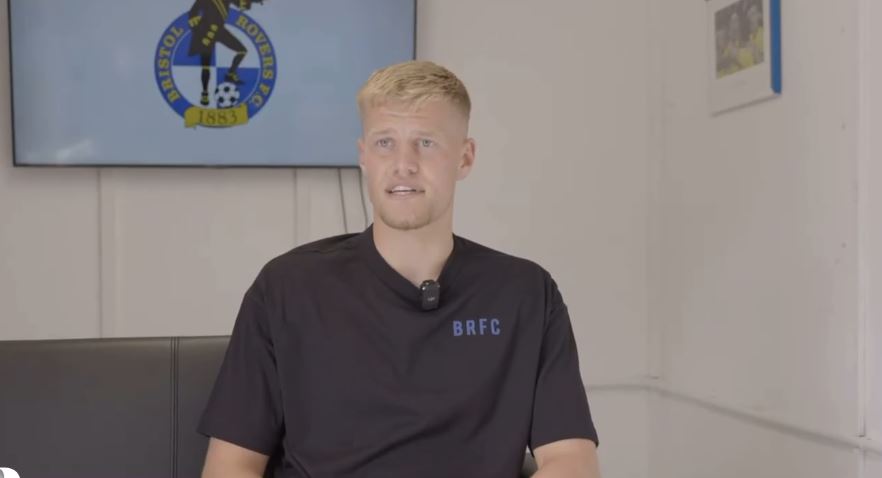
Brad Young’s pay has emerged as a subtly potent topic of conversation in both back-office boardrooms and football forums in recent months. More than just a football migration story, his journey from the English Midlands to the Saudi Arabian deserts is an example of timing, tenacity, and astute judgment. By the age of 22, Young was earning £13,000 a week, which not only helped him land a lucrative job but also changed the standards for players outside of the elite bracket.
After a thrilling season at The New Saints, where he won the Cymru Premier Golden Boot and Young Player of the Year, Young joined a group of young players who were taking advantage of Saudi football’s explosive financial growth by joining Al-Orobah in 2024. His transfer occurred at a critical juncture when Gulf clubs were deliberately assembling rosters that included both promising European prospects and aging stars who might otherwise be mired in development limbo.
Brad Young: Career Profile and Financial Snapshot
| Attribute | Information |
|---|---|
| Full Name | Bradley Jamie Ethan Young |
| Birthdate | January 6, 2003 |
| Age | 22 |
| Height | 1.85 m |
| Position | Right Winger / Forward |
| Nationality | English |
| Current Status | Free Agent (Last club: Al-Orobah FC, Saudi Pro League) |
| Last Known Weekly Salary | £13,000 |
| Annual Salary (2024–2025) | £676,000 |
| Estimated Net Worth | £923,780 |
| Highest Transfer Fee | £190,000 from The New Saints to Al-Orobah (Record for Welsh club) |
| Youth Academies | West Bromwich Albion, Aston Villa |
When compared to the gradual raises of his previous years, Brad Young’s pay increase is especially intriguing. He was still on contract at Aston Villa in 2020, earning just over £6,000 annually. He was earning over £676,000 a year by 2025, which was a startling 100-fold increase over his early career earnings. This type of acceleration is uncommon and reflects a football economy that is growing more globalized and multilayered.
Football salary structures have become more dispersed over the last ten years. With astute contract decisions, a number of players, like Young, are quietly establishing sustainable careers for every Kylian Mbappé making headlines with nine-figure deals. He took a calculated risk when he joined Al-Orobah, but it has worked incredibly well to establish him as a player who prioritizes long-term success over league reputation.
Although Brad Young only managed two goals and one assist in 16 games in Saudi Arabia, his worth cannot be determined solely by his stats. Clubs in emerging football economies are investing in future scalability rather than just immediate output, much like they would in a young startup. Young brought a highly professional mindset, a track record of scoring goals from Wales, and European training standards. Despite being incredibly resilient over extended seasons, these attributes are frequently underappreciated in dazzling highlight reels.
His £190,000 transfer fee caused a stir in the Welsh football scene and set a record for The New Saints. Young set an example for others in lower leagues to follow by turning one outstanding domestic season into a record sale and a salary that changed people’s lives. His decision served as an encouraging reminder to young players in Scotland, Ireland, and even lower divisions of the English league that recognition and compensation are not limited to the top five leagues.
The Young transfer was also highly symbolic in the context of Saudi Arabia’s football development. Once on the periphery of global media attention, clubs like Al-Orobah are now leveraging astute acquisitions to increase brand awareness. These clubs have leverage not only on the field but also in sponsorship agreements and market appeal when they have a European player with Premier League training, youth honors, and a high potential resale value.
Therefore, Brad Young’s pay is more than just a paycheck; it reflects the changing priorities in contemporary football. Players now consider options across a more varied landscape, whereas in the past, chasing Premier League cameos was a badge of honor. Saudi Arabia, Major League Soccer, and even Southeast Asia offer opportunities for early-stage careers, particularly post-academy, that are surprisingly cost-effective in terms of lifestyle and highly efficient in terms of earning potential.
The way Young overcame hardship prior to this paycheck is especially noteworthy. He almost lost his life and his football career when he was 17 years old and survived a vicious stabbing in Solihull. Physicians said he might never be able to play again. However, he returned to Aston Villa’s training ground in 2021, where he scored in the FA Youth Cup before making his senior debut. His career has been built on that level of tenacity; every contract he has since signed has felt like a footnote in a comeback tale that is still being written.
Since his contract with Al-Orobah formally expired and he became a free agent, there has been conjecture regarding his future plans in recent days. According to some insiders, he might look into returning to the UK, perhaps playing in the Scottish Premiership or League One. Others allude to a transfer to Australia’s A-League, where an increasing number of British athletes have discovered competitive games and high compensation.
By carefully navigating his way up the football hierarchy—beginning in the Premier League academy system, going through loan periods, then establishing himself in Wales before earning money overseas—Brad Young has established a model that is not only realistic but also notably creative in a sport that frequently values dramatic shortcuts over gradual advancement.
